Peter MacKay facts for kids
Quick facts for kids
Peter MacKay
|
|
|---|---|
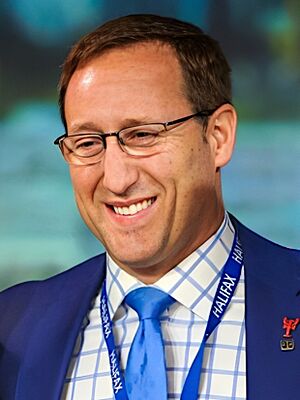
MacKay in 2014
|
|
| Minister of Justice Attorney General of Canada |
|
| In office July 15, 2013 – November 4, 2015 |
|
| Prime Minister | Stephen Harper |
| Preceded by | Rob Nicholson |
| Succeeded by | Jody Wilson-Raybould |
| Minister of National Defence | |
| In office August 14, 2007 – July 15, 2013 |
|
| Prime Minister | Stephen Harper |
| Preceded by | Gordon O'Connor |
| Succeeded by | Rob Nicholson |
| Minister of Foreign Affairs | |
| In office February 6, 2006 – August 14, 2007 |
|
| Prime Minister | Stephen Harper |
| Preceded by | Pierre Pettigrew |
| Succeeded by | Maxime Bernier |
| Minister for the Atlantic Canada Opportunities Agency | |
| In office February 6, 2006 – January 19, 2010 |
|
| Prime Minister | Stephen Harper |
| Preceded by | Joe McGuire |
| Succeeded by | Keith Ashfield |
| Deputy Leader of the Conservative Party | |
| In office March 22, 2004 – November 5, 2015 |
|
| Leader | Stephen Harper |
| Preceded by | Position established |
| Succeeded by | Denis Lebel |
| Leader of the Progressive Conservative Party | |
| In office May 31, 2003 – December 7, 2003 |
|
| Preceded by | Joe Clark |
| Succeeded by | Position abolished |
| Member of Parliament for Central Nova (Pictou—Antigonish—Guysborough; 1997–2004) |
|
| In office June 2, 1997 – October 19, 2015 |
|
| Preceded by | Roseanne Skoke |
| Succeeded by | Sean Fraser |
| Personal details | |
| Born |
Peter Gordon MacKay
September 27, 1965 New Glasgow, Nova Scotia, Canada |
| Political party | Conservative (since 2003) |
| Other political affiliations |
Progressive Conservative (1997–2003) |
| Spouse | |
| Children | 3 |
| Parents |
|
| Residences | Pictou County, Nova Scotia |
| Alma mater |
|
| Occupation |
|
Peter Gordon MacKay (born September 27, 1965) is a Canadian lawyer and politician. He was a Member of Parliament (MP) from 1997 to 2015. An MP is a person elected to represent a group of people in the House of Commons.
MacKay held important jobs in the Canadian government under Prime Minister Stephen Harper. He was the Minister of Justice and Attorney General from 2013 to 2015. Before that, he was the Minister of National Defence (2007–2013) and Minister of Foreign Affairs (2006–2007). A minister is a senior member of the government who leads a specific department.
He was the last leader of the Progressive Conservative Party of Canada. In 2003, he helped merge this party with another, the Canadian Alliance. This created the Conservative Party of Canada, which is one of the main political parties in Canada today.
Peter MacKay's father, Elmer MacKay, was also a Canadian politician. Peter studied at Acadia University and Dalhousie University to become a lawyer. He represented areas in Nova Scotia, first Pictou—Antigonish—Guysborough (1997–2004) and then Central Nova (2004–2015). He decided not to run in the 2015 election. After leaving politics, he worked as a lawyer. In 2020, he ran to become the leader of the Conservative Party but was not chosen.
Contents
Early Life and Education
Peter MacKay was born in New Glasgow, Nova Scotia. His father, Elmer MacKay, was a lawyer and a former government minister. His mother, Eirene Macha MacKay, was a psychologist. Peter grew up in Wolfville, Nova Scotia, with his three brothers and sisters.
He went to Horton High School. Then, he earned a Bachelor of Arts degree from Acadia University and Carleton University in 1987. After that, he studied law at Dalhousie University. He became a lawyer in Nova Scotia in 1991.
Before becoming a politician, MacKay worked for a steel company in Halifax, Nova Scotia, and in Germany. In 1993, he became a Crown Attorney in Nova Scotia. This meant he worked as a lawyer for the government, prosecuting cases in court. MacKay has said that he entered politics because he wanted to improve the justice system. He felt that the courts did not always focus enough on how crimes affected victims.
Becoming a Member of Parliament
MacKay was first elected to the House of Commons of Canada in the 1997 federal election. He represented the area of Pictou—Antigonish—Guysborough in Nova Scotia. He was one of several younger politicians elected at that time. People saw them as future leaders who could help their party.
In his first term, MacKay worked as the Justice Critic for his party. This meant he spoke for his party on issues related to justice. He was also the House Leader for the Progressive Conservative group in Parliament. He helped manage the party's work in the House of Commons.
MacKay was re-elected in the 2000 federal election. Many people thought he might become the leader of the Progressive Conservative Party.
Leading the Progressive Conservative Party
In 2003, the leader of the Progressive Conservative Party, Joe Clark, announced he would step down. Peter MacKay decided to run for the leadership. He wanted to bring together different conservative groups in Canada.
During the leadership contest, MacKay was a strong candidate. He focused on his leadership skills and building a national team. He won the final vote with about 65% of the support from party members.
Forming the Conservative Party
After becoming leader, MacKay worked to unite the conservative movement in Canada. The Progressive Conservative Party and the Canadian Alliance were two separate parties. Many people believed that if they joined, they would be stronger.
On October 15, 2003, MacKay and the leader of the Canadian Alliance, Stephen Harper, agreed to create a new party. This new party was called the Conservative Party of Canada. Most members of both parties supported this idea.
Some politicians from the Progressive Conservative Party did not agree with the merger. They chose to remain independent or join other parties. In January 2004, MacKay announced he would not run to be the leader of the new Conservative Party. Instead, he became the Deputy Leader under Stephen Harper. He was re-elected as an MP in the 2004 federal election for the area of Central Nova.
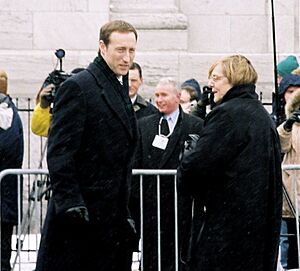
In 2006, the Conservative Party won the federal election and formed a minority government. Peter MacKay kept his seat in Parliament.
Government Roles
Minister of Foreign Affairs
After the 2006 election, Prime Minister Stephen Harper appointed Peter MacKay as the Minister of Foreign Affairs. This meant he was in charge of Canada's relationships with other countries. He also became the Minister for the Atlantic Canada Opportunities Agency, which helps with economic development in Atlantic Canada.
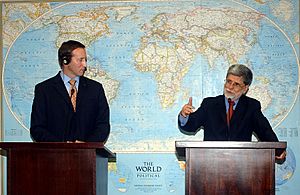
One of his biggest challenges was the conflict between Lebanon, Israel, and Hezbollah in July 2006. The Canadian government worked to help thousands of Canadians leave Lebanon and return home safely. MacKay supported Israel during this conflict. He also called Hezbollah a "cancer" in Lebanon. The Canadian government officially considers Hezbollah a terrorist organization.
Minister of National Defence
On August 14, 2007, MacKay became the Minister of National Defence. This role put him in charge of Canada's military.

In 2007, while visiting a military base in Afghanistan, two rockets hit the base. MacKay was not hurt. In 2008, he announced a plan to spend a lot of money to improve the Canadian military's equipment over 25 years.
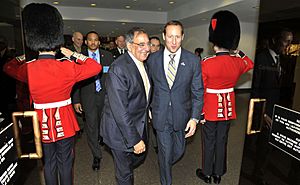
In 2010, MacKay was criticized for using a military helicopter to travel from a fishing camp to an airport. He said he used it to also take part in a search and rescue demonstration.
Minister of Justice and Attorney General
On July 15, 2013, MacKay became the Minister of Justice and Attorney General of Canada. This job involves overseeing the country's legal system.
After Parliament
Life After 2015
On May 29, 2015, Peter MacKay announced that he would not run in the 2015 federal election. After leaving politics, he joined a law firm called Baker McKenzie as a partner. His family lives in Toronto.
In 2016, there was talk that MacKay might try to become the leader of the Conservative Party again. However, on September 12, 2016, he announced he would not seek the leadership.
2020 Conservative Leadership Race
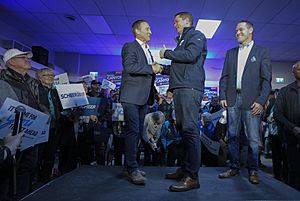
In January 2020, Peter MacKay announced he would run for the leadership of the Conservative Party of Canada. He officially started his campaign on January 25, 2020, in Stellarton, Nova Scotia.
He was a strong candidate in the race. However, he was defeated by Erin O'Toole in the final round of voting. After the leadership race, MacKay moved back to Nova Scotia. He now works as a senior counsel at a law firm and as an advisor for a consulting company.
Personal Life
Peter MacKay married Nazanin Afshin-Jam on January 4, 2012, in Mexico. Nazanin was born in Iran and is a former beauty queen. She has degrees in international relations and political science. She also co-founded a human rights group called Stop Child Executions.
Peter and Nazanin have three children: two sons, Kian Alexander MacKay (born April 1, 2013) and Caledon Cyrus MacKay (born July 28, 2018), and one daughter, Valentia Makaja MacKay (born September 30, 2015).
In his free time, MacKay has volunteered for many groups, including Big Brothers Big Sisters and the YMCA. He enjoys sports and played rugby, baseball, football, and hockey in his community.
Electoral Record
| Candidate | 1st ballot | 2nd ballot | 3rd ballot | ||||||||||
|---|---|---|---|---|---|---|---|---|---|---|---|---|---|
| Votes cast | % | Points allocated | % | Votes cast | % | Points allocated | % | Votes cast | % | Points allocated | % | ||
 |
Erin O'Toole | 51,258 | 29.39% | 10,681.40 | 31.60% | 56,907 | 33.20% | 11,903.69 | 35.22% | 90,635 | 58.86% | 19,271.74 | 57.02% |
 |
Peter MacKay | 52,851 | 30.30% | 11,328.55 | 33.52% | 54,165 | 31.60% | 11,756.01 | 34.78% | 63,356 | 41.14% | 14,528.26 | 42.98% |
 |
Leslyn Lewis | 43,017 | 24.67% | 6,925.38 | 20.49% | 60,316 | 35.20% | 10,140.30 | 30.00% | Eliminated | |||
 |
Derek Sloan | 27,278 | 15.64% | 4,864.67 | 14.39% | Eliminated | |||||||
| Total | 174,404 | 100% | 33,800 | 100% | 171,388 | 100% | 33,800 | 100% | 153,991 | 100% | 33,800 | 100% | |
| Canadian federal election, 2011: Central Nova | ||||||||
|---|---|---|---|---|---|---|---|---|
| Party | Candidate | Votes | % | ±% | Expenditures | |||
| Conservative | Peter MacKay | 21,593 | 56.79 | +10.19 | $66,993.75 | |||
| New Democratic | David Parker | 9,412 | 24.75 | +5.19 | $22,391.41 | |||
| Liberal | John Hamilton | 5,614 | 14.76 | – | $38,162.02 | |||
| Green | Matthew Chisholm | 1,406 | 3.70 | -28.54 | $3,941.29 | |||
| Total valid votes/expense limit | 38,025 | 100.0 | $83,138.94 | |||||
| Total rejected, unmarked and declined ballots | 226 | 0.59 | -0.18 | |||||
| Turnout | 38,251 | 65.00 | -2.01 | |||||
| Eligible voters | 57,963 | |||||||
| Conservative hold | Swing | +2.50 | ||||||
| Sources: | ||||||||
| Canadian federal election, 2008: Central Nova | ||||||||
|---|---|---|---|---|---|---|---|---|
| Party | Candidate | Votes | % | ±% | Expenditures | |||
| Conservative | Peter MacKay | 18,240 | 46.60 | +5.94 | $61,468.89 | |||
| Green | Elizabeth May | 12,620 | 32.24 | +30.65 | $57,490.60 | |||
| New Democratic | Louise Lorifice | 7,659 | 19.56 | -13.33 | $39,917.36 | |||
| Christian Heritage | Michael Harris MacKay | 427 | 1.09 | – | none listed | |||
| Canadian Action | Paul Kemp | 196 | 0.50 | – | $87.79 | |||
| Total valid votes/expense limit | 39,142 | 100.0 | $80,462 | |||||
| Total rejected, unmarked and declined ballots | 304 | 0.77 | +0.42 | |||||
| Turnout | 39,446 | 67.01 | -2.16 | |||||
| Eligible voters | 58,863 | |||||||
| Conservative hold | Swing | -24.71
|
||||||
| Canadian federal election, 2006: Central Nova | ||||||||
|---|---|---|---|---|---|---|---|---|
| Party | Candidate | Votes | % | ±% | Expenditures | |||
| Conservative | Peter MacKay | 17,134 | 40.66 | -2.61 | $55,938.56 | |||
| New Democratic | Alexis MacDonald | 13,861 | 32.89 | +5.23 | $28,582.28 | |||
| Liberal | Dan Walsh | 10,349 | 24.56 | -1.83 | $43,064.69 | |||
| Green | David Orton | 671 | 1.59 | -1.09 | $901.04 | |||
| Marxist–Leninist | Allan H. Bezanson | 124 | 0.29 | – | none listed | |||
| Total valid votes/expense limit | 42,139 | 100.0 | $75,651 | |||||
| Total rejected, unmarked and declined ballots | 147 | 0.35 | -0.17 | |||||
| Turnout | 42,286 | 69.17 | +3.85 | |||||
| Eligible voters | 61,137 | |||||||
| Conservative hold | Swing | -3.92
|
||||||
| Canadian federal election, 2004: Central Nova | ||||||||
|---|---|---|---|---|---|---|---|---|
| Party | Candidate | Votes | % | ±% | Expenditures | |||
| Conservative | Peter MacKay | 16,376 | 43.27 | -8.13 | $53,745.97 | |||
| New Democratic | Alexis MacDonald | 10,470 | 27.66 | +14.84 | $25,231.91 | |||
| Liberal | Susan Green | 9,986 | 26.39 | -3.95 | $44,229.04 | |||
| Green | Rebecca Mosher | 1,015 | 2.68 | – | $222.50 | |||
| Total valid votes/expense limit | 37,847 | 100.0 | $73,053 | |||||
| Total rejected, unmarked and declined ballots | 198 | 0.52 | ||||||
| Turnout | 38,045 | 65.32 | -0.92 | |||||
| Eligible voters | 58,240 | |||||||
| Conservative notional gain from Progressive Conservative | Swing | -11.48 | ||||||
| Changes from 2000 are based on redistributed results. Conservative Party change is based on the combination of Canadian Alliance and Progressive Conservative Party totals. | ||||||||
| Candidate | 1st ballot | 2nd ballot | 3rd ballot | 4th ballot | |||||
|---|---|---|---|---|---|---|---|---|---|
| Votes cast | % | Votes cast | % | Votes cast | % | Votes cast | % | ||
 |
MACKAY, Peter Gordon | 1,080 | 41.1% | 1,018 | 39.7% | 1,128 | 45.0% | 1,538 | 64.8% |
 |
PRENTICE, James (Jim) | 478 | 18.2% | 466 | 18.2% | 761 | 30.4% | 836 | 35.2% |
| ORCHARD, David | 640 | 24.3% | 619 | 24.1% | 617 | 24.6% | Endorsed MacKay | ||
 |
BRISON, Scott A. | 431 | 16.4% | 463 | 18.0% | Endorsed Prentice | |||
| CHANDLER, Craig B. | 0 | — | Withdrew before 1st ballot began; Endorsed Prentice | ||||||
| Total | 2,629 | 100.0% | 2,566 | 100.0% | 2,506 | 100.0% | 2,374 | 100.0% | |
| Canadian federal election, 2000: Pictou—Antigonish—Guysborough | ||||||||
|---|---|---|---|---|---|---|---|---|
| Party | Candidate | Votes | % | |||||
| Progressive Conservative | Peter MacKay | 19,256 | 48.32 | |||||
| Liberal | Raymond Mason | 12,634 | 31.70 | |||||
| New Democratic | Wendy Panagopoulous | 4,498 | 11.29 | |||||
| Alliance | Harvey Henderson | 2,915 | 7.31 | |||||
| Independent | Darryl Gallivan | 551 | 1.38 | |||||
| Canadian federal election, 1997: Pictou—Antigonish—Guysborough | ||||||||
|---|---|---|---|---|---|---|---|---|
| Party | Candidate | Votes | % | |||||
| Progressive Conservative | Peter MacKay | 18,196 | 42.34 | |||||
| Liberal | Francis Leblanc | 12,851 | 29.90 | |||||
| New Democratic | Charlene Long | 8,284 | 19.28 | |||||
| Reform | Henry Van Berkel | 3,416 | 7.95 | |||||
| Natural Law | Richard Robertson | 228 | 0.53 | |||||
See also
 In Spanish: Peter MacKay para niños
In Spanish: Peter MacKay para niños
 | Dorothy Vaughan |
 | Charles Henry Turner |
 | Hildrus Poindexter |
 | Henry Cecil McBay |

